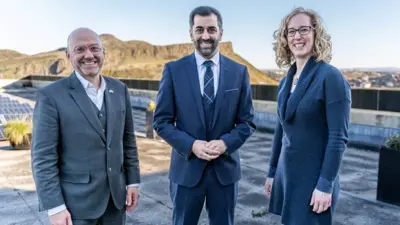We've updated our Privacy and Cookies Policy
We've made some important changes to our Privacy and Cookies Policy and we want you to know what this means for you and your data.
Yorkshire's former mills 'could create 9,000 new homes' - Historic England
Image source, Historic England
Re-using Yorkshire's historic mills could create 9,000 homes or provide office space for almost 30,000 jobs, according to Historic England.
The organisation said there are currently 237 vacant and underused mills across the region.
It said they offer an environmentally beneficial alternative to building new homes on greenfield sites.
The body said they could be repurposed to offer "wonderful homes, workplaces and cultural spaces".
A report, commissioned by Historic England, said there is more than eight million sq ft (750,000 sq-m) of vacant floor space - the equivalent of about 105 football pitches - which it said was enough to accommodate almost 9,000 homes.
It added there was also space for 15,400 homes on land surrounding the sites or, if transformed into workplaces instead, the mills could accommodate 27,600 jobs.
The report also highlighted the environmental benefits of refurbishing existing buildings.
Trevor Mitchell from Historic England said: "Yorkshire's mills are such an important part of our history, culture and landscape.
"These amazing buildings and sites can accommodate wonderful homes, workplaces and cultural spaces.
"Special places where the history and character shines through."
'Mills can make a difference'
Image source, Sunny Bank Mills
Sunny Bank Mill in Farsley, near Leeds, stopped producing textiles after 180 years in 2008.
But rather than see it flattened or fall into disrepair, owners the Gaunt family were determined to keep people in the structure.
"We were very keen the mill should be preserved as much as possible and that it should continue to be a place of employment," William Gaunt said.
Farsley was becoming a dormitory village for Leeds and was "losing a bit of its soul," he added.
They wanted to put the mill back at the "heart of the community".
It is now home to offices, retailers, cafes and restaurants, an art gallery, studio spaces, a mill archive and has also opened a culture venue for performing arts.
Mr Gaunt said he hoped the mill had made a change in the community.
"We do listen to the community and we use the talents of the community to drive what we do."
He admitted mills can pose challenges for development.
"Every mill is unique, there's no one size fits all, they can be put in the 'too difficult box' by developers and left.
"They are substantial lumps of buildings and they have the scale to make a difference in their setting."
The report has been presented to the Northern Culture All-Party Parliamentary Group, whose vice-chair, Jason McCartney, said regenerating mills could unlock social and economic benefits.
The Conservative MP for Colne Valley pointed to conversions in his own constituency such as Acre Mill, which has been redeveloped into the NHS Outpatients Department for Huddersfield Royal Infirmary.
"These conversions each, in their own way, make a valuable contribution to the community and I am keen to help unlock opportunities for future mill redevelopment in my constituency," he said.
Follow BBC Yorkshire on Facebook, Twitter and Instagram. Send your story ideas to yorkslincs.news@bbc.co.uk or send video here.
Top Stories
Features & Analysis
Most read
Content is not available








